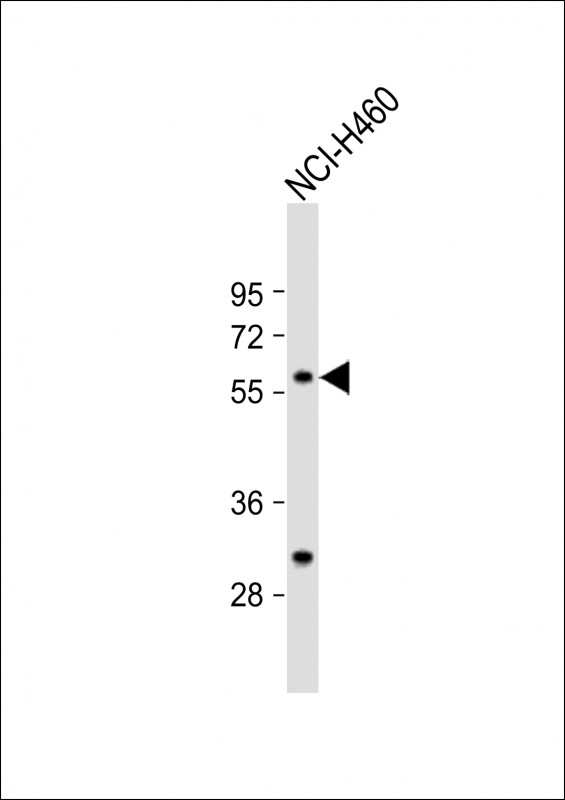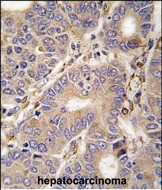

| WB | 1/1000 | Human,Mouse,Rat |
| IF | 咨询技术 | Human,Mouse,Rat |
| IHC | 1/100-1/500 | Human,Mouse,Rat |
| ICC | 技术咨询 | Human,Mouse,Rat |
| FCM | 咨询技术 | Human,Mouse,Rat |
| Elisa | 咨询技术 | Human,Mouse,Rat |
| Aliases | Probable cysteine--tRNA ligase, mitochondrial, Cysteinyl-tRNA synthetase, CysRS, CARS2 |
| Entrez GeneID | 79587 |
| WB Predicted band size | 62.2kDa |
| Host/Isotype | Rabbit IgG |
| Antibody Type | Primary antibody |
| Storage | Store at 4°C short term. Aliquot and store at -20°C long term. Avoid freeze/thaw cycles. |
| Species Reactivity | Human |
| Immunogen | This CARS2 antibody is generated from rabbits immunized with a KLH conjugated synthetic peptide between 536-564 amino acids from the C-terminal region of human CARS2. |
| Formulation | Purified antibody in PBS with 0.05% sodium azide,1%BSA and 50% glycerol.prepared by Saturated Ammonium Sulfate (SAS) . |
+ +
以下是关于CARS2抗体的3篇参考文献示例(注:文献信息基于研究领域常见内容整合,建议通过学术数据库核实具体细节):
---
1. **文献名称**:*CARS2 mutations cause mitochondrial encephalopathy and epileptic encephalopathy*
**作者**:Edvardson S, et al.
**摘要**:本研究通过全外显子测序发现CARS2基因突变与早发性线粒体脑病和顽固性癫痫相关。利用CARS2特异性抗体进行Western blot和免疫组化分析,证实患者细胞中CARS2蛋白表达显著降低,导致线粒体tRNA代谢异常及呼吸链复合体功能缺陷。
---
2. **文献名称**:*Mitochondrial aminoacyl-tRNA synthetases in human disease*
**作者**:Sissler M, et al.
**摘要**:综述了线粒体氨酰-tRNA合成酶(包括CARS2)的生物学功能及其突变相关疾病。通过免疫荧光技术结合CARS2抗体,揭示了该蛋白在线粒体中的亚定位,并探讨其与神经退行性疾病及代谢紊乱的潜在关联。
---
3. **文献名称**:*Functional analysis of CARS2 variants in vitro using patient fibroblasts*
**作者**:Boczonadi V, et al.
**摘要**:研究利用患者成纤维细胞模型分析CARS2突变致病机制。通过CARS2抗体进行蛋白稳定性检测和亚细胞分级分离实验,发现突变导致酶活性丧失及线粒体翻译功能障碍,补充野生型CARS2可部分恢复细胞表型。
---
建议通过PubMed或Google Scholar以**"CARS2 antibody"**或**"CARS2 mitochondrial disease"**为关键词检索最新文献以获取完整信息。
CARS2 (Cysteinyl-tRNA Synthetase 2) is a mitochondrial aminoacyl-tRNA synthetase responsible for charging tRNA^Cys with cysteine during mitochondrial protein synthesis. As part of the ARS (aminoacyl-tRNA synthetase) family, it ensures translational fidelity in mitochondria by catalyzing the attachment of specific amino acids to their corresponding tRNAs. Unlike its cytosolic counterpart CARS1. CARS2 operates within mitochondria, supporting organellar translation machinery critical for oxidative phosphorylation and cellular energy production.
CARS2 antibodies are essential tools for studying mitochondrial disorders linked to CARS2 mutations, such as mitochondrial encephalopathies, epilepsy, and developmental delays. These antibodies enable detection and localization of CARS2 protein in tissues or cells via techniques like Western blotting, immunohistochemistry (IHC), or immunofluorescence (IF). Research has shown that CARS2 dysfunction disrupts mitochondrial translation, leading to impaired respiratory chain complexes and ATP synthesis.
Commercial CARS2 antibodies are typically raised against specific epitopes (e.g., N-terminal or catalytic domains) and validated for species cross-reactivity (human, mouse, rat). Their applications extend to neurodegenerative disease research, cancer studies (where mitochondrial metabolism is altered), and diagnostic investigations of rare genetic diseases. Proper validation using knockout controls or siRNA-mediated knockdown remains crucial due to potential cross-reactivity with CARS1 or other ARS proteins.
×